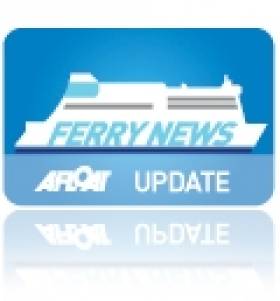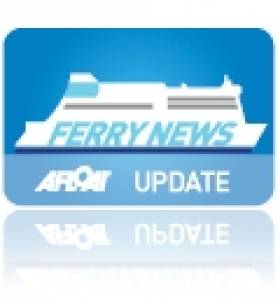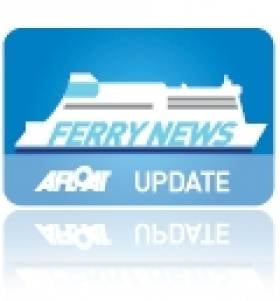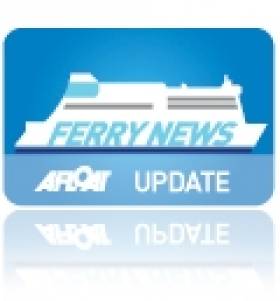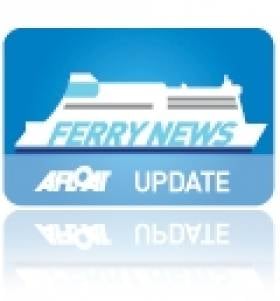Displaying items by tag: Stena Line Freight
#SuperfastCharter – The pair of 'Superfast' ferries serving Stena Line's Belfast-Cairnryan route have been extended on a charter contract with Tallink until August 2019.
The extended period is a further development of the company's freight business on the North Channel route between Northern Ireland and Scotland. The route offers up to 12 sailings daily with the Superfast vessels, Stena Superfast VII and Stena Superfast VIII on the 2 hour 15 minute crossing.
Since the inaugural sailings of the Superfast ferries in November 2011, they have boosted capacity to the route, service reliability and a steady increase in freight volumes. On board, freight drivers benefit from dedicated facilities of a lounge with a restaurant. The Superfast lounges feature first class style reclining seats.
According to Stena Line Freight, they continue to broaden business by offering new services, for example, a fuel-facility in Loch Ryan Port, Cairnryan and with Add Blue now available in addition to diesel.
The terminals at Belfast Harbour Freight hub are in close proximity for hauliers by combining operations with Stena Line's other routes to Liverpool (Birkenhead) and Heysham.
As previously reported on Afloat.ie, the freight-ferry Stena Hibernia on Belfast to Liverpool (Birkenhead) is now operating to an adjusted sailing schedule. The route is also served by a pair of passenger ro-pax sisters, Stena Lagan and Stena Mersey.
Busier Times for Birkenhead
#Birkenhead – Busier times lay ahead for Birkenhead Twelve Quays Terminal next week when Stena Line introduce a third ship on the route to Belfast while today the Isle of Man Steam Packet resumed a winter service, writes Jehan Ashmore.
As previously reported Stena Line were set to launch the freight-only ferry earlier this week however bad weather and technical difficulties delayed the entry of Stena Hibernia (1996/13,007grt).
The 114-trailer freight-ferry will initially operate eight sailings per week. These extra sailings will depart Birkenhead Tues – Fri (at 0300hrs) and depart Belfast Tues – Fri (at 1500hrs). She will be sharing the double-linkspan berth at Birkenhead with the company's ro-pax sisters.
The Ben-My-Chree of the Isle of Man Steam Packet operates the weekend-only service from Douglas with a round-trip on Saturday's and this is repeated on Sunday's.The return of the ro-pax to the Mersey replaces fast-craft Manannan sailings between the Manx capital and Liverpool. Facing directly opposite is Birkenhead on the Wirral Peninsula.
Ben-My-Chree continues operating Douglas-Heysham weekday sailings on the route she has served as a reliable workhorse for the last 15 years. The Steam Packet are to charter the freight-ferry Arrow on the Manx-Cumbrian service in response to competition early next year from new operator Ellan Vannin Line.
Delayed Freight-Ferry's Launch on Belfast-Liverpool Route
#FreightFerry – Stena Line's plan to launch a freight-only ferry on the Belfast-Liverpool (Birkenhead) on Tuesday as previously reported, has been delayed to next week, writes Jehan Ashmore.
Having had technical issues, the 114-trailer capacity Stena Hibernia (1996/13,007grt) also encountered bad weather. She is currently in the English Channel on a repositioning voyage understood to have departed from Brunsbuettel.
The introduction of Stena Hibernia as the routes third ship will see the vessel join passenger ro-pax sisters Stena Lagan and Stena Mersey. The 1996 built freight-ferry will initially run 8 sailings weekly departing Belfast Tues-Fri (at 15.00hrs) and from Birkenhead Tues – Fri (at 0300hrs).
For the ferry aficionado, the use of 'Hibernia' as you may recall is not the first vessel name given to a Stena ship. The last and former Dun Laoghaire-Holyhead conventional car-ferry St. Columba was renamed Stena Hibernia following a major refit in 1991.
Her owners choose to revive one of the traditional 'mail' boat names along with 'Cambria' on the Welsh route as running mate Stena Cambria was relocated from the Dover-Calais route, where she originally served as the St. Anselm.
Ferry Circles Dublin Bay Buoy in Readiness for Refit
#FERRY REFIT – In readiness for annual refit, Stena Line's Dublin-Holyhead two-ship service, is to be relieved shortly by a chartered Finnish ro-pax ferry, Finnarrow (1996/25,996grt) which carried out 'berthing trials' in Dublin Port yesterday, writes Jehan Ashmore.
When the Stena Nordica (2000/24,206grt) is away in dry-dock, Finnarrow will take her roster in tandem with the route's second ro-pax Stena Advanturer. The relief ferry is owned by Finnlines and she has a 274 passenger capacity, space for 800 cars and can handle 154-freight trailer units.
In order for Finnarrow to perform berthing procedures at the single linkspan used exclusively by Stena Line at Dublin Ferryport (Terminal 2), the Stena Nordica departed the port into the rough sea of Dublin Bay. During this time she circled the Dublin Bay Buoy and throughout the bay, before returning to the berth just vacated by Finnarrow, so to resume her scheduled afternoon sailing to Holyhead.
Finnarrow had earlier this week set sail from the German Baltic Sea port of Travemünde and arrived at the Welsh port on Wednesday lunchtime, where she also undertook berthing trails.
Ironically both Stena Nordica and Finnarrow served together on Stena Line's Karlskrona-Gdyania route several years ago, where the latter vessel was also chartered out on their Harwich-Hook van Holland route.
The Finnarrow, which unusually for a Scandinavian operator, was built in Indonesia, when ordered for original owners Rederi AB Gotland. Under her current role, she is part of the Finnlines (Grimaldi Group) of operations running 14 ro-pax vessels between six countries and eleven ports throughout the Baltic and North Sea.
Stena Line Freight Wins Award
#LOGISTIC AWARDS – Stena Line Freight collected the Irish Sea Shipping Line of the Year Award at the Export & Freight Transport & Logistics Awards 2012.
The award was presented to Stena Line's Irish Sea freight commercial manager Frank Nieuwenhuys, at a ceremony held this week at the Ramada Hotel in Belfast.
Among the winners was Carna Transport based in Monaghan, which won in the best European Haulier category while NMC Haulage of Dungannon, Co. Tyrone picked up Haulier of the Year.


























